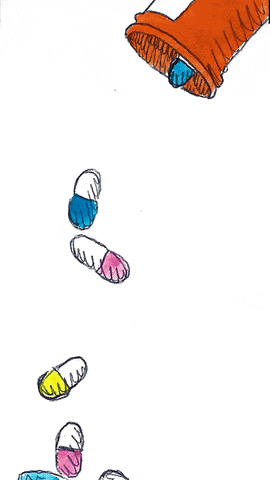AI Uses Lung Scans to Predict Risk of Death, Low Dose Aspirin Risks When Used for Prevention, More Evidence Supporting Plant-Based Diet & What Should You Eat?
The Full Panel meets your TLDR (Too Long; Didn’t Read) needs by delivering the latest medicine & health news in a nutshell. 🥜
AI uses lung scans to predict risk of death

Gist: Researchers have developed a new artificial intelligence (AI) model that uses lung scans to predict the risk of death from lung cancer, heart disease, and other causes. This study used low-dose CT scans, which are used for annual lung screenings in people between 50 and 80 years old who are at high risk of lung cancer, usually due to a history of heavy smoking.
Nitty-Gritty: These scans provide a wealth of additional information about other structures within the chest, including body composition. This is important because changes in body composition, like obesity or muscle loss, have been linked to chronic health conditions.
The team used an AI to automatically measure body composition from these CT scans. They tested this system on over 200,000 patients from the National Lung Screening Trial and found that these measurements improved predictions about who was at risk of death from lung cancer, heart disease, and other causes.
They found that a particular body composition measurement, associated with a condition called myosteatosis, was especially good at predicting risk. Myosteatosis, sometimes referred to as muscle steatosis, refers to the increased accumulation of fat within muscles.
Big Picture: This additional information from a routine CT scan can help identify high-risk individuals for interventions like exercise programs or lifestyle changes even before they are greatly affected by disease. The team hopes to further test the benefits of this AI model in future studies.
Original source: here.
Using low-dose aspirin for stroke and heart attack prevention carries some risks.

Gist: A recent study published in JAMA has shown that low-dose aspirin, taken daily, doesn't provide significant protection against strokes, and may actually increase the risk of brain bleeding. This backs up previous advice that healthy older adults without a history of heart conditions or stroke shouldn't take low-dose aspirin regularly.
Nitty-Gritty: The study also supports the U.S. Preventive Services Task Force's recommendation against prescribing low-dose aspirin for preventing a first heart attack or stroke in healthy older adults. In 2020, similar guidance was publish by the Heart & Stroke Foundation of Canada.
The research drew on data from 19,000 people over 70 from Australia and America, who did not have heart disease. The findings indicated that aspirin slightly lowered the rate of ischemic stroke, which occurs when a clot blocks a blood vessel to the brain, but the difference wasn't significant. In contrast, there was a 38% higher rate of brain bleeds among those taking daily aspirin compared to those on a placebo.
As one expert not involved in the study put it, people who are healthy and don't already take aspirin shouldn't start now. However, the situation isn't as clear-cut for those with more risk factors for heart attacks and strokes. The longer you've been taking aspirin and the more risk factors you have, the less clear the advice becomes.
Big Picture: That said, some experts maintain that daily aspirin should still be part of the regimen for people who have already had a heart attack or stroke.
For optimal results, it's best to tailor assessments and considerations to the individual rather than adopting a one-size-fits-all approach.
Original source: here.

Gist: The United Nations' Food and Agriculture Organization recently highlighted the nutritional importance of meat, eggs, and milk. However, a new study published in the European Heart Journal reveals the significant cardiovascular benefits of plant-based diets.
Nitty-Gritty: This research is a comprehensive review of 30 trials involving 2,372 participants from 1982 to 2022. The study analyzed vegetarian and vegan diets in contrast to omnivorous diets and evaluated their impacts on total cholesterol, LDL ("bad" cholesterol), triglycerides, and apolipoprotein B (apoB). This is a unique meta-analysis, taking into account variables like continent, age, body mass index, and health status, and it’s the first to study the effect on apoB concentrations—a marker for harmful fats and cholesterol.
The findings? Vegetarian and vegan diets led to a 14% reduction in artery-clogging lipoproteins, equating to a third of the benefits of cholesterol-lowering drugs like statins. Dr. Ruth Frikke-Schmidt, the chief physician at Rigshospitalet in Copenhagen and part of the research team, indicated that these diets could result in a 7% decrease in cardiovascular disease risk over five years. Although statins are superior in reducing fats and cholesterol, combining them with a plant-based diet could amplify the benefits. Plant-based eaters saw a 7% drop in total cholesterol, 10% in LDL, and 14% in apoB. The diet also curbed the risk of various diseases, including diabetes, certain cancers, and dementia.
Big Picture: Beyond individual health, the global benefits are considerable. Plant-based diets could reduce greenhouse gas emissions by 35%-49% in developed countries. Frikke-Schmidt emphasizes that these diets cater to diverse individuals while also addressing the environmental crisis. Adopting a predominantly plant-based diet can help counteract the medical costs of aging populations and pivot food production towards sustainability. In conclusion, Frikke-Schmidt recommends a varied, plant-centric diet supplemented with water.
Original source: here.
Beyond Text:
At the 37:45 timestamp of the Rich Roll podcast, Dr. Alan Desmond discusses the question, "What Should I Eat?" for those considering plant-based eating or those considering incorporating more plant-based meals into their day-to-day.
Interested in previous newsletters or other articles we’ve published? Check them out here at: thefullpanel.com
Got a question for us? Suggestions for content you’d like to see? Feedback? E-mail us at: hello@mail.thefullpanel.com
